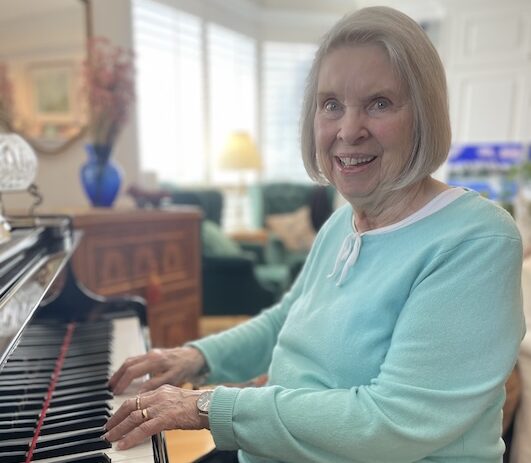Marilyn Jackson recalls waking up, breathless, with a terrible cramp in her leg. “I’m going to die, I remember thinking.”
The 87-year-old has since learned that her shortness of breath was due to heart failure. With the help of a few medications, Marilyn is breathing easy now and living independently.
“I clean my house, do errands using my walker and see friends and family a lot,” says Marilyn, an avid piano player and former downhill skier on Canada’s national team. “I’ve always been active, so it’s a relief to have such a simple plan that allows me to do the things I want to.”
Heart failure, which occurs when the heart is damaged or weakened, has no cure, but can be effectively treated with the right medication and lifestyle modifications, says Dr. Stephanie Poon, Director, Sunnybrook’s Heart Function Clinic. Currently over 800,000 Canadians are living with heart failure.
“Our goal is to provide patients like Marilyn, and their families, with strategies to greatly improve their quality of life,” says Dr. Poon.
She notes that some patients are prescribed puffers and antibiotics for months before a correct diagnosis is made. “Those are really missed opportunities, where people aren’t receiving the correct treatment, and the disease progresses. The result is that rates of heart failure are rising. And this is amid the reality that heart failure is deadlier than many common forms of cancer.”
She urges people experiencing shortnwess of breath, swelling in their legs or abdomen and fatigue, to seek testing for heart failure. A blood test called natriuretic peptide (NP) levels, also known as BNP or NT-pro BNP, is a reliable diagnostic tool. Elevated NP levels indicate that symptoms may be related to heart failure, prompting further investigation by a physician.
Sunnybrook’s Heart Function Clinic has incorporated the Medly app into their model of care, enabling patients to record daily weight, blood pressure, heart rate, and symptoms. In turn, patients receive instant electronic feedback on how to adjust their medications or alerts based on personalized thresholds and care plans. A nurse practitioner uses a web-based dashboard to assess patients’ health status and respond to alerts generated through the app.
“By enabling early interventions in response to symptom changes, the Medly app can result in dramatic improvements to patients’ health and reductions in hospitalizations,” says Dr. Poon.
For Marilyn, the combination of medication and ensuring she drinks roughly two litres of water a day has made a massive difference. “If I could say anything from my experience, it’s to not delay seeking care if you’re not feeling right,” adds Marilyn. “There are treatment options that can be as simple as taking
medication.”


